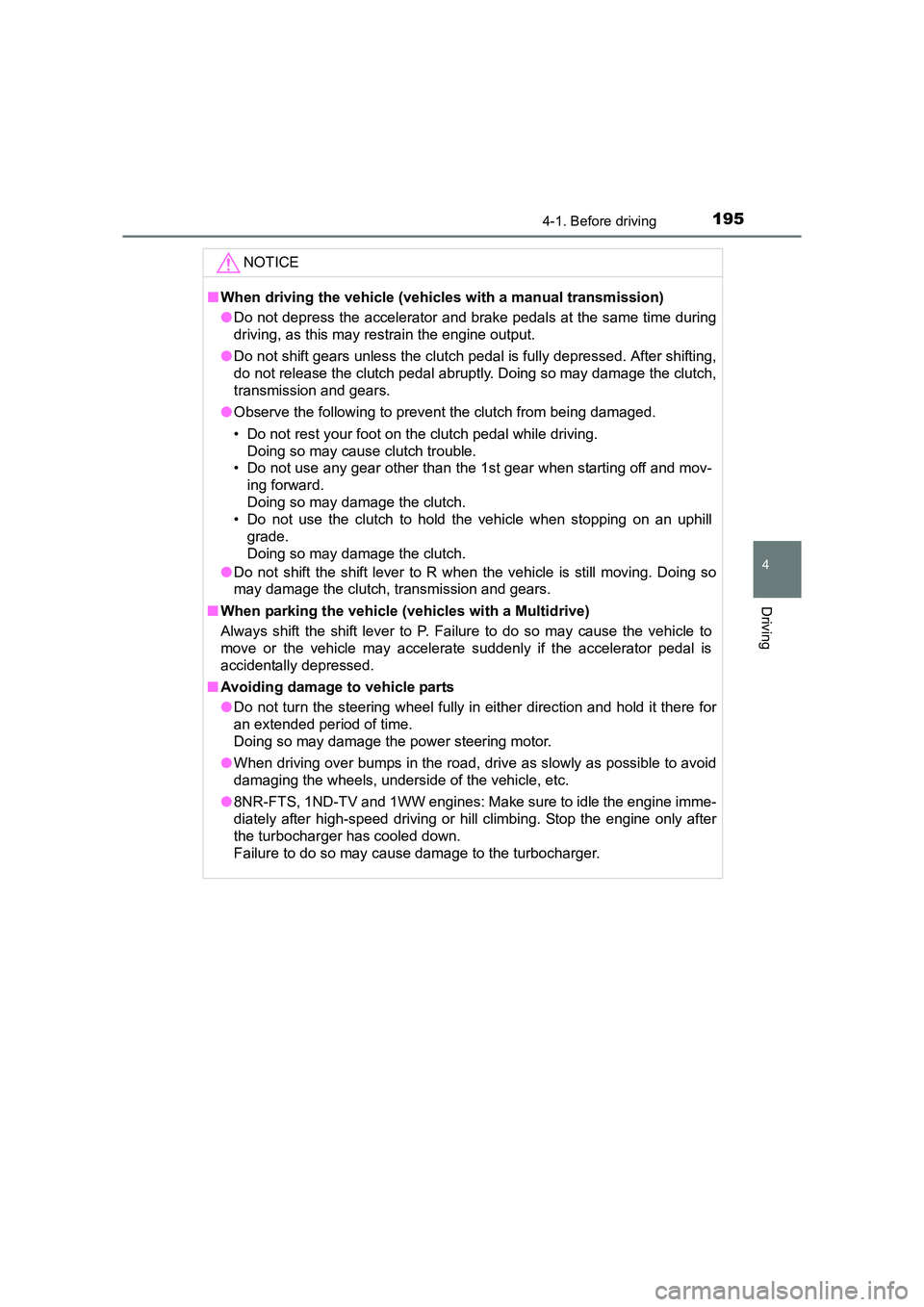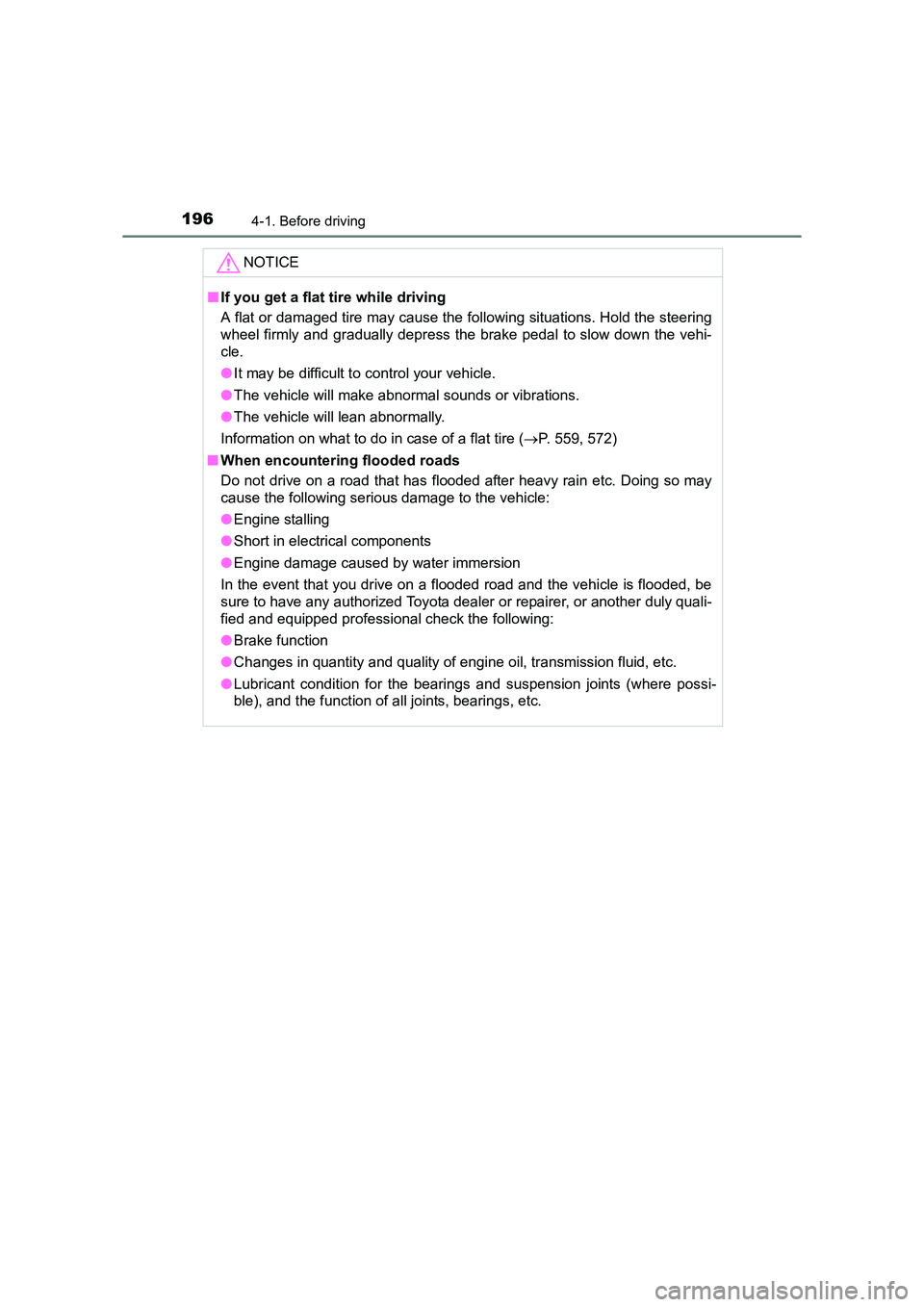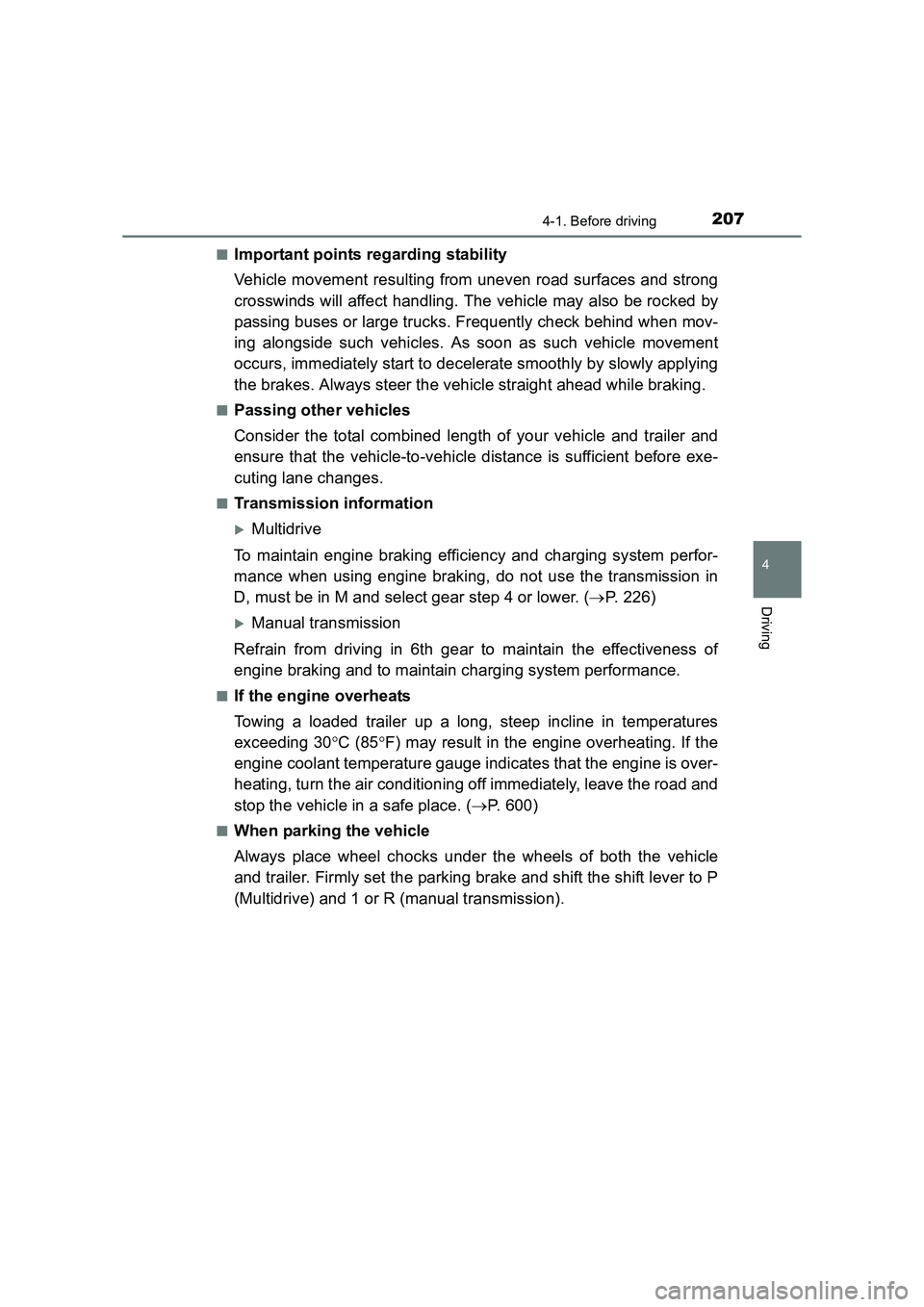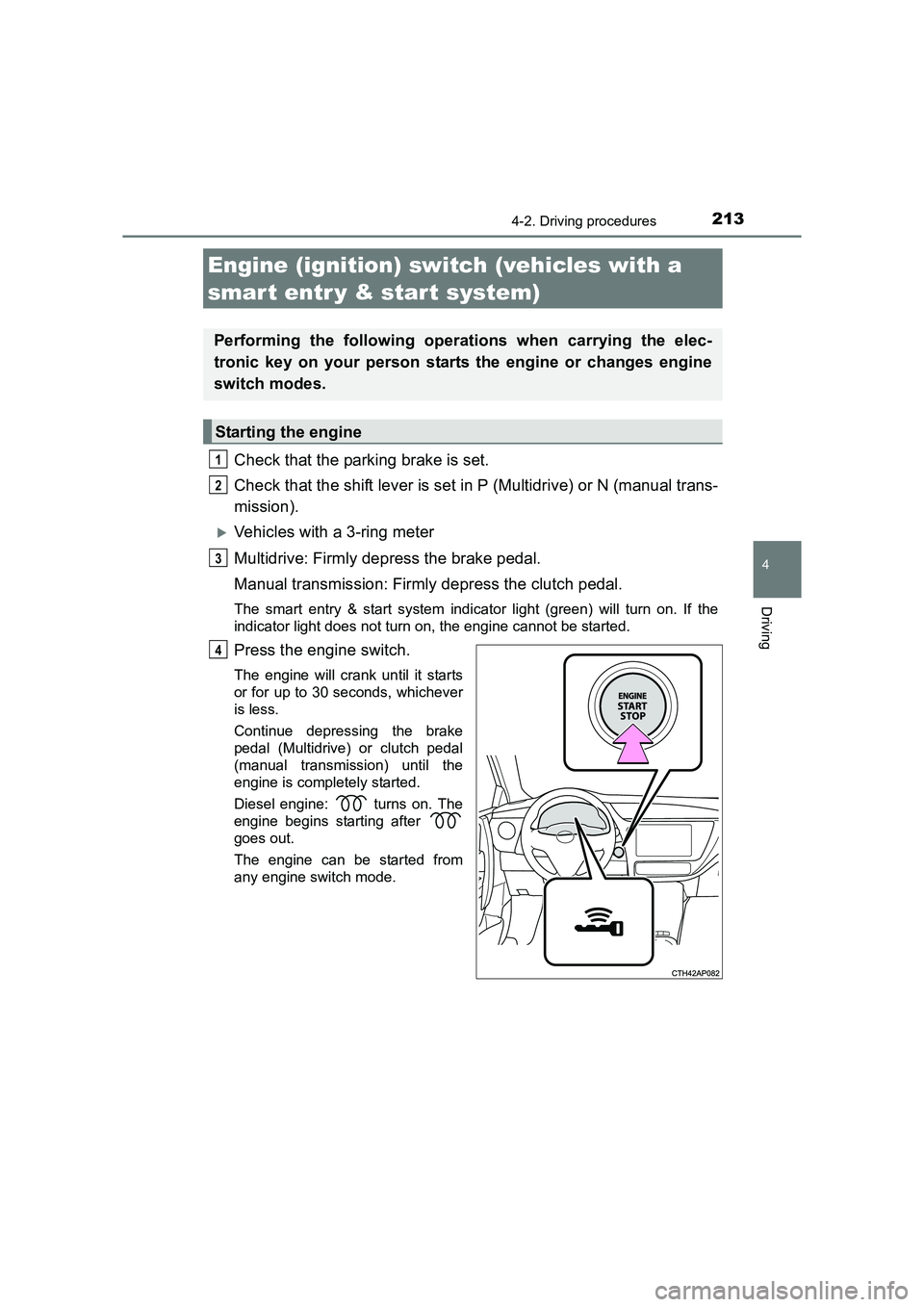Page 195 of 660

1954-1. Before driving
AURIS Touring Sports_EE (12K53E)
4
Driving
NOTICE
■When driving the vehicle (vehicles with a manual transmission)
●Do not depress the accelerator and brake pedals at the same time during
driving, as this may restrain the engine output.
● Do not shift gears unless the clutch pedal is fully depressed. After shifting,
do not release the clutch pedal abruptly. Doing so may damage the clutch,
transmission and gears.
● Observe the following to prevent the clutch from being damaged.
• Do not rest your foot on the clutch pedal while driving.
Doing so may cause clutch trouble.
• Do not use any gear other than the 1st gear when starting off and mov-
ing forward.
Doing so may damage the clutch.
• Do not use the clutch to hold the vehicle when stopping on an uphill
grade.
Doing so may damage the clutch.
● Do not shift the shift lever to R when the vehicle is still moving. Doing so
may damage the clutch, transmission and gears.
■ When parking the vehicle (vehicles with a Multidrive)
Always shift the shift lever to P. Failure to do so may cause the vehicle to
move or the vehicle may accelerate suddenly if the accelerator pedal is
accidentally depressed.
■ Avoiding damage to vehicle parts
●Do not turn the steering wheel fully in either direction and hold it there for
an extended period of time.
Doing so may damage the power steering motor.
● When driving over bumps in the road, dr ive as slowly as possible to avoid
damaging the wheels, underside of the vehicle, etc.
● 8NR-FTS, 1ND-TV and 1WW engines: Make sure to idle the engine imme-
diately after high-speed driving or hill climbing. Stop the engine only after
the turbocharger has cooled down.
Failure to do so may cause damage to the turbocharger.
Page 196 of 660

1964-1. Before driving
AURIS Touring Sports_EE (12K53E)NOTICE
■
If you get a flat tire while driving
A flat or damaged tire may cause the following situations. Hold the steering
wheel firmly and gradually depress the brake pedal to slow down the vehi-
cle.
●It may be difficult to control your vehicle.
● The vehicle will make abnormal sounds or vibrations.
● The vehicle will lean abnormally.
Information on what to do in case of a flat tire ( →P. 559, 572)
■ When encountering flooded roads
Do not drive on a road that has flooded after heavy rain etc. Doing so may
cause the following serious damage to the vehicle:
●Engine stalling
● Short in electrical components
● Engine damage caused by water immersion
In the event that you drive on a flooded road and the vehicle is flooded, be
sure to have any authorized Toyota deale r or repairer, or another duly quali-
fied and equipped professional check the following:
● Brake function
● Changes in quantity and quality of engine oil, transmission fluid, etc.
● Lubricant condition for the bearings and suspension joints (where possi-
ble), and the function of all joints, bearings, etc.
Page 207 of 660

2074-1. Before driving
AURIS Touring Sports_EE (12K53E)
4
Driving
■Important points regarding stability
Vehicle movement resulting from uneven road surfaces and strong
crosswinds will affect handling. The vehicle may also be rocked by
passing buses or large trucks. Frequently check behind when mov-
ing alongside such vehicles. As soon as such vehicle movement
occurs, immediately start to decelerate smoothly by slowly applying
the brakes. Always steer the vehicle straight ahead while braking.
■Passing other vehicles
Consider the total combined length of your vehicle and trailer and
ensure that the vehicle-to-vehicle distance is sufficient before exe-
cuting lane changes.
■Transmission information
�XMultidrive
To maintain engine braking efficiency and charging system perfor-
mance when using engine braking, do not use the transmission in
D, must be in M and select gear step 4 or lower. ( →P. 226)
�XManual transmission
Refrain from driving in 6th gear to maintain the effectiveness of
engine braking and to maintain charging system performance.
■If the engine overheats
Towing a loaded trailer up a long, steep incline in temperatures
exceeding 30 °C (85 °F) may result in the engine overheating. If the
engine coolant temperature gauge indicates that the engine is over-
heating, turn the air conditioning off immediately, leave the road and
stop the vehicle in a safe place. ( →P. 600)
■When parking the vehicle
Always place wheel chocks under the wheels of both the vehicle
and trailer. Firmly set the parking brake and shift the shift lever to P
(Multidrive) and 1 or R (manual transmission).
Page 209 of 660
209
AURIS Touring Sports_EE (12K53E)
4
Driving
4-2. Driving procedures
�XMultidrive
Check that the parking brake is set.
Check that the shift lever is set in P.
Sit in the driver’s seat and firmly depress the brake pedal.
Turn the engine switch to the “START” position and start the
engine.
�XManual transmission (gasoline engine)
Check that the parking brake is set.
Check that the shift lever is set in N.
Firmly depress the clutch pedal.
Turn the engine switch to the “START” position and start the
engine.
�XManual transmission (diesel engine)
Check that the parking brake is set.
Check that the shift lever is set in N.
Firmly depress the clutch pedal.
Turn the engine switch to the “ON” position.
turns on.
After goes out, turn the engine switch to the “START” position
and start the engine.
Engine (ignition) switch (vehicles without a
smar t entr y & start system)
Starting the engine
1
2
3
4
1
2
3
4
1
2
3
4
5
Page 213 of 660

2134-2. Driving procedures
AURIS Touring Sports_EE (12K53E)
4
Driving
Check that the parking brake is set.
Check that the shift lever is set in P (Multidrive) or N (manual trans-
mission).
�XVehicles with a 3-ring meter
Multidrive: Firmly depress the brake pedal.
Manual transmission: Firmly depress the clutch pedal.
The smart entry & start system indicator light (green) will turn on. If the
indicator light does not turn on, the engine cannot be started.
Press the engine switch.
The engine will crank until it starts
or for up to 30 seconds, whichever
is less.
Continue depressing the brake
pedal (Multidrive) or clutch pedal
(manual transmission) until the
engine is completely started.
Diesel engine: turns on. The
engine begins starting after
goes out.
The engine can be started from
any engine switch mode.
Engine (ignition) switch (vehicles with a
smar t entr y & start system)
Performing the following operations when carrying the elec-
tronic key on your person starts the engine or changes engine
switch modes.
Starting the engine
1
2
3
4
Page 214 of 660
2144-2. Driving procedures
AURIS Touring Sports_EE (12K53E)
�XVehicles with a 2-ring meter
Multidrive: Firmly depress the brake pedal.
Manual transmission: Firmly depress the clutch pedal.
will be displayed on the multi-information display.
If it is not displayed, the engine cannot be started.
Press the engine switch.
The engine will crank until it starts
or for up to 30 seconds, whichever
is less.
Continue depressing the brake
pedal (Multidrive) or clutch pedal
(manual transmission) until the
engine is completely started.
Diesel engine: turns on. The
engine begins starting after
goes out.
The engine can be started from
any engine switch mode.
3
4
Page 215 of 660
2154-2. Driving procedures
AURIS Touring Sports_EE (12K53E)
4
Driving
Multidrive: Stop the vehicle.
Manual transmission: While depressing the clutch pedal, stop the
vehicle.
Multidrive: Shift the shift lever to P.
Manual transmission: Shift the shift lever to N.
Set the parking brake. (→P. 232)
Press the engine switch.
Vehicles with a 3-ring meter: Release the brake pedal (Multidrive)
or clutch pedal (manual transmission) and check that the smart
entry & start system indicator light (green) is off.
Vehicles with a 2-ring meter: Release the brake pedal (Multidrive)
or clutch pedal (manual transmission) and check that “Power ON.”
on the multi-information display is off.
Stopping the engine
1
2
3
4
5
Page 216 of 660
2164-2. Driving procedures
AURIS Touring Sports_EE (12K53E)
Modes can be changed by pressing the engine switch with brake
pedal (Multidrive) or clutch pedal (manual transmission) released.
(The mode changes each time the switch is pressed.)
�XVehicles with a 3-ring meter
Off
*
The emergency flashers can be
used.
The smart entry & start system
indicator light (green) is off.
ACCESSORY mode
Some electrical components such
as the power outlet can be used.
The smart entry & start system
indicator light (green) flashes
slowly.
IGNITION ON mode
All electrical components can be
used.
The smart entry & start system
indicator light (green) flashes
slowly.
*: Vehicles with a Multidrive: If the shift lever is in a position other than P when turning off the engine, the engine switch will be turned to ACCES-
SORY mode, not to off.
Changing engine switch modes